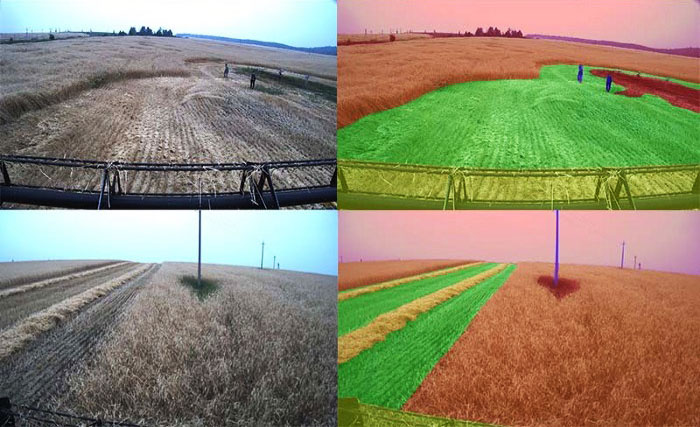Cognitive Agro Pilot – an autonomous AI-based driving system for farming equipment, which was designed by Sberbank and its ecosystem member Cognitive Pilot – has been proven in industrial use across 35 regions of Russia during the 2020 harvest.
From June to October 2020, over 350 New Holland, John Deere and Claas autonomous combines equipped with the Cognitive Agro Pilot system farmed over 160,000 hectares of field and harvested more than 720,000 tons of crops.
With the help of Cognitive Agro Pilot, as many as 590,000 metric tons of grain crops (wheat, soybeans, barley, oats, sorghum, buckwheat, etc.) were harvested from over 130,000 hectares; and some 130,000 metric tons of row crops and roll crops (corn, sunflower, etc.) were harvested from over 30,000 hectares in regions including Kaliningrad, Kaluga, Kursk, Belgorod, Tambov, Penza, Rostov, Tomsk, Kurgan, Krasnodar, Krasnoyarsk, and Stavropol.
The use of autonomous technology allowed stakeholders to save on fuel and other related materials, shorten harvesting time (machine hours) and lessen equipment depreciation, extend the active use of equipment before capital expenditure, reduce human errors, and optimise business processes and other parameters – saving an aggregate of over US$6.5 million, according to Sber and Cognitive Pilot.
Cognitive Pilot’s clients include some of Russia’s largest agricultural holdings: EkoNiva, the Resource Group of Companies, Steppe Agroholding, Yug Rusi GC, Tkachev Agrocomplex, Peschanokopskaya Agrarnaya Gruppa, Yugo-Vostochnaya Agrogruppa, and many more. According to the estimates of project members, in the next three years, every tenth harvester in Russia could become autonomous.
How does Cognitive Agro Pilot work?
Cognitive Agro Pilot is an autonomous AI-based driving system for farming equipment such as grain combine harvesters, tractors, and sprayers. It includes an autonomous unit to manage farm equipment, a video camera, a display, a set of connecting cables, and other control system elements. The user interface is available via an Android mobile app for smartphones or rugged tables.
The system analyses images from just one video camera and, by using a deep learning convolutional neural network fine-tuned for agronomic purposes, understands the types and positions of objects facing the machinery, builds movement trajectories, and sends commands to perform manoeuvres.
The companies behind it claim it is the world’s first system that not only ‘sees’ but ‘understands’ what’s lying ahead, providing an advantage over other solutions that utilise a raft of tools for their control models, such as GPS navigation with RTK positioning, etc. The edge capture when controlling a harvester by the Cognitive Agro Pilot system is stable within 10cm, which avoiding unnecessary passes and consequent fuel loss. With the autopilot mode on, the setup avoids obstacles and stops when detecting a possible collision threat with other equipment or people.
“Controlled by the Cognitive Agro Pilot system, machines have worked over 230,000 hours, passing over 950,000km this year,” said Olga Uskova, CEO, Cognitive Pilot, wth regard to the system’s deployment during the recent harvest. “These high figures prove the setup is reliable and called-for among farmers. Partnership with Sberbank and leading agricultural holdings allows us not only to scale the use of technology efficiently but also guarantee that our clients enjoy high-quality local service.”
“A few years back, artificial intelligence in agriculture was a technology much talked about, but there were no practical examples of its widespread adoption in Russia,” added Anatoly Popov, deputy chairman of the executive board, Sberbank. “Now, once the first harvesting campaign with smart combines is over, we can say with confidence that the future is becoming a reality before our eyes, and what is especially pleasing is that this is happening with the direct participation of Sber. Russia is one of the leading countries in terms of agricultural production and is a key exporter of wheat – therefore, given the scale of production, the Cognitive Agro Pilot system has the potential to save the domestic agro-industrial complex millions of dollars.”
“Equipping harvesters with autonomous control systems has increased the efficiency of harvesting significantly,” concluded Bjorne Drexler, first deputy CEO, EkoNivaTekhnika-Holding. “Considering the wide dealer network of EkoNivaTekhnika-Holding and the fact that the system can be installed on any combine, regardless of the manufacturer’s brand and model, we can confidently say we’ve taken part in what is currently the largest industrial project aimed at agtech robotisation. Combine operators were among the first to appreciate the capabilities of Cognitive Agro Pilot. The system really helps in their work, reduces the load, and allows you to focus on other harvesting parameters. All this enhances the efficiency of business processes and saves resources.”
In September 2020, the Cognitive Agro Pilot solution won the Overall Harvesting Innovation of the Year award at AgTec Breakthrough Awards 2020, while in 2019, it won the AVT ACES AWARD, organised by Autonomous Vehicle International magazine.



